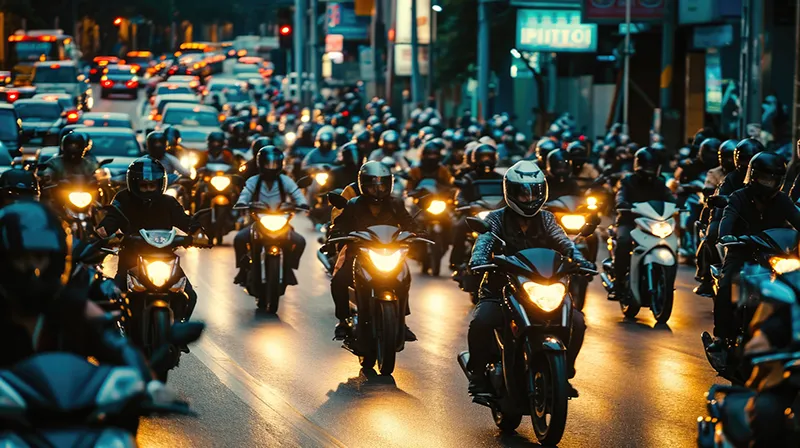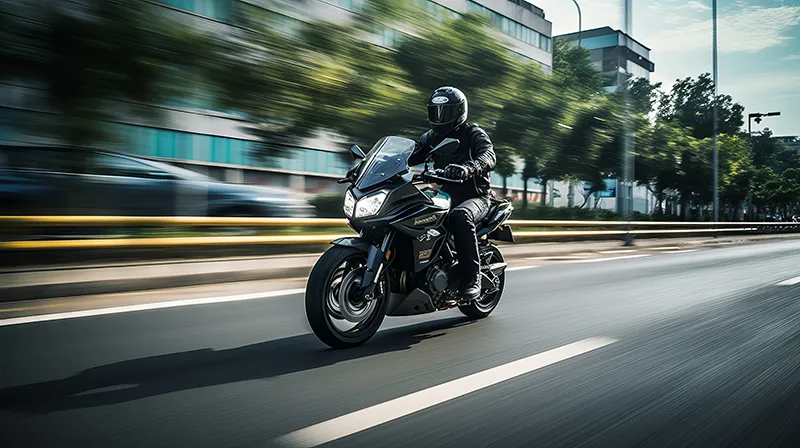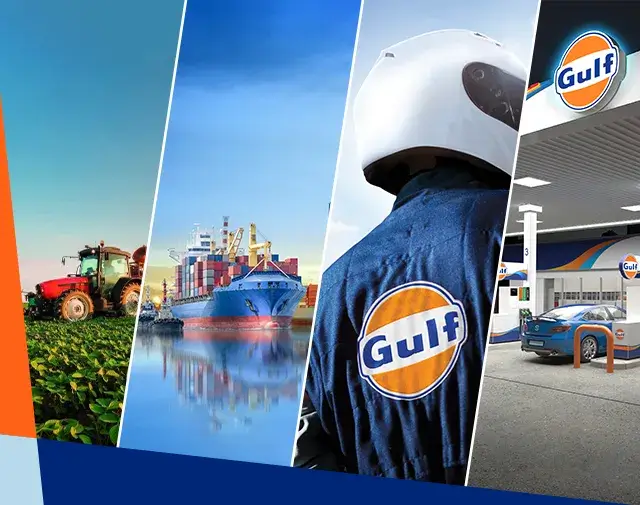A Guide to Maintaining Motorcycle Performance in Cities
19 Dec 2024

If you do a lot of city riding, it can be pretty hard on motorcycle engines over time. As a consequence, your motorcycle can potentially lose performance and even suffer engine damage if not looked after well.
In this article, we look at some of the challenges of urban motorcycling, how city riding can affect your bike mechanically and how to improve motorcycle longevity if you do lots of your journeys in these kinds of settings.
The Challenges of City Riding with a Motorcycle
While cities do vary, and some may be less or more stop/start than others, one thing that most cities have in common is lots of traffic, especially at certain times of the day. Traffic controlling and calming measures, such as traffic lights, roundabouts, speed bumps or humps and varying road surfaces and speed restrictions mean that drivers of any kind of vehicle using the urban roads need to drive in a different way to how they would on the open road.
The same is certainly true of motorcyclists. All of those frequent stops and starts, quick acceleration and repeated braking, sitting idling in traffic and varying road conditions can mean your motorcycle gets put through things that can have mechanical consequences over time.
How City Riding Affects Motorcycle Engines
While in many ways, motorcycles are ideally suited getting around urban roads, being much more manoeuvrable than most other kinds of vehicle, city riding can take a toll on motorcycle engines over time in a few different ways, including:
Increased wear and tear - With frequent short journeys, it doesn’t always give the motorcycle engine time to warm up to its optimal operating temperature properly, which can result in friction between moving parts if the engine oil doesn’t have the chance to circulate fully.
Engine overheating - Sitting in heavy traffic on the back of your motorcycle is one of the most common causes of engine overheating, with prolonged idling and reduced airflow causing the temperature to creep up.
Sludge buildup - If a motorcycle is mainly doing lots of short journeys, which is common with city riding, or the engine is running hot because of traffic, it can mean that sludge builds up more quickly. This reduces motorcycle engine efficiency and if not resolved, can cause serious engine damage.
Performance fluctuations - Whether it’s the build up of sludge and faster degradation of engine oil, an overheating engine or wear and tear on various parts, motorcycles that do a lot of city riding can find that performance can drop off at times and more frequent maintenance work is needed to keep it running optimally.
Engine deposits and power loss - Lots of city riding and frequent stopping/starting can cause carbon buildup in the motorcycle engine, which may result in engine deposits and can affect the power capacity of the engine if not removed. Eventually, this can cause real engine damage unless the motorcycle is maintained effectively.

The Importance of High-Quality Engine Oil
When it comes to preventing some of the issues associated with lots of short urban journeys, a good-quality engine oil that is specifically developed for motorcycles can make a really important difference.
The right motorcycle engine oil can:
- Help protect the engine against wear and tear.
- Improve the efficiency of lubrication, minimising friction by creating a barrier between moving parts.
- Reduce the engine deposits forming.
- Enhance performance, by helping with heat dissipation and extending the engine life.
- Prevent clutch slippage, by maintaining optimal friction levels during clutch engagement and disengagement.
Find out more about how motorcycle engine oils can affect performance.
Tips for Maintaining Motorcycle Performance in Urban Environments
If many of your motorcycle journeys are in an urban setting, there are some steps you can take to help maintain your motorcycle’s performance and help extend the life of various parts. These include:
Regular maintenance
- Checking your oil regularly; not only the level, but also to check whether the oil has started to degrade.
- Changing your motorcycle oil and filter regularly - at least once a year.
- Checking your tyres visually for any damage or signs of excessive wear before every ride, along with checking tyre pressure every couple of weeks or before longer journeys.
- Regularly checking your brake pads, rotors and brake fluid levels, replacing brake fluid every 6-12 months.
- Regularly check your motorcycle battery and keep the terminals clean.
- Regularly check all lights are operational.
Find out more about effectively maintaining your motorcycle.

Warming your motorcycle up properly
Especially in colder weather, warming your motorcycle engine up before putting any big demands on it can help extend its life and keep it running more smoothly. A short period of idling should be enough if you’re using a high-quality motorcycle engine oil, but taking things steady for the first few minutes of every journey is always a good idea until the engine gets up to optimal temperature.
Avoid excessive idling
While a short idle to help your engine warm up before riding off is usually beneficial, lots of idling once your engine is already at temperature can cause problems over time and may result in overheating. Switching off the engine if waiting for long periods in traffic can be beneficial over excessive idling.
Choose the right engine oil for your motorcycle
Choosing an engine oil for your motorcycle that has been specifically developed for the way that you use it can help prolong the life of your engine, clutch and keep things running more smoothly for longer. Find the right engine oil for your motorcycle...

